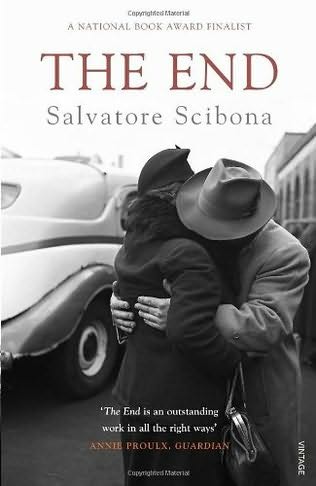
Riverhead Trade (2009, paper), 336 p.
Reviewed by Alyse Walsh
Salvatore Scibona’s recently released debut novel, The End, is a tale of identity, belonging and a whole lot of longing in an American immigrant community in the first half of the twentieth century. The reader signs on for a strange and tragic DeLorean ride traversing time, and occasionally continents, to worlds that surely would have scared or at least depressed the hell out of Marty McFly.
Scibona’s cast of complex and troubled characters are thick and colorful threads overlapping and intertwining to weave a wicked yet beautiful Altman-like tapestry that tells their life stories, which intrinsically and indirectly intersect on one fateful day in August of 1953 in Elephant Park, the carnivalesque immigrant community in Ohio they have all wound themselves into from their motherland of Italy.
We’re first introduced to Rocco, Elephant Park’s loyal and tragic baker who immigrated to this Ohioan hell-hole assumedly for the grand opportunities of an American life. Rocco works every day of his life without rising in social status or making real friends in the community and has been deserted by his wife and three sons. Finally the news of the death of one of his boys spurs a re-evaluation that sets him on a journey to get back what is important in life, his remaining loved ones. We’re rooting for sad Rocco, who turns out to be the one character with a real shot at redemption, and ready to set forth on his journey with him. But Scibona hardly returns to Rocco’s story until the very end when it intersects, in a slightly contrived way, with other events that take precedence throughout the novel. It is this skipping and bouncing between people and time that intentionally set the reader up for disappointment as they grow attached to a character just in time for them to die or to be plopped into someone else’s miserable life.
But where Scibona frustrates and teases his reader, he also indulges by painting a vividly colorful, pungent, and clamorous world in which the struggling immigrants trudge through putrid refuse-filled streets, gouge pus from their wounds, scrape sludge from between their toes, and slit the throats of fuzzy bunnies. Like in Annie Proulx’s skillful concoctions of the brutal but beautiful American life, Scibona does not sugar coat. Life was hard and pretty much everything smelled really, really bad. This vividly sour taste of life in Elephant Park is almost enough to hold our attention until after the halfway mark, when pivotal events of the novel come into focus.
Now, the jig-sawed pieces of the puzzle begin to click into each other’s nooks and it’s clear that the real drama was occurring right under our noses the whole time. Costanza Marini, the old widow who ends up taking the front seat of the novel, judges, scowls, and tampers with the lives of others all the while performing boot-leg abortions for other god-fearing community members in her basement (the gory details of which Scibona does not scrimp on either.) Ciccio, the teenaged boy who lives with her and seems to be the only other being she really cares for (besides the ghost of her husband Nico, of course) turns out not to be the son of his late and infertile father Enzo, but rather the result of a random and violent rape of his faint-hearted mother who abandoned him years before. Suddenly, things are getting really juicy.
This welcomed contrast from the frustratingly unhurried pace of the first half suddenly presents the feeling that you, the reader, are a part of the ill-fated immigrant community. You also would probably have had these secrets right under your nose all along, only to sniff them out years later after morsels of gossip, spread through a giant neighborhood game of telephone, had at last been properly transcribed.
The End is winner of the 2009 New York Public Library Young Lions Fiction Award as well as a National Book Award Finalist. While the time warping (the novel spans four decades) and constant shifting between characters both alive and dead can leave the reader oft befuddled, the non-linear narrative brings the filth, despair, and confused optimism of immigrant-ridden middle America to life in a way that one expects from a veteran rather than a first-time novelist.
